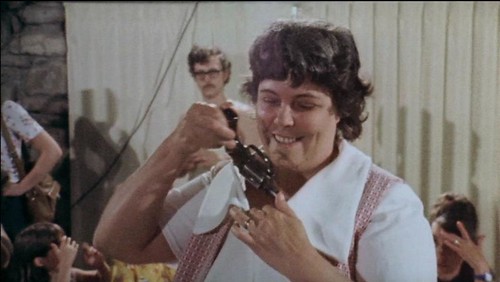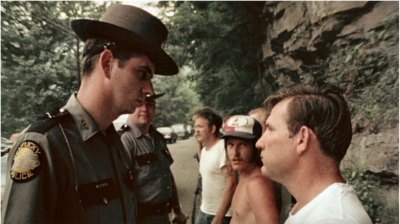
I chose a screening of a film very personal to me for my first trek to Brooklyn Academy of Music (or BAM as it's known by everyone). BAM Rose Cinemas (30 Lafayette Avenue, Brooklyn) celebrated the 35th anniversary of HARLAN COUNTY U.S.A., one of the best American documentaries ever made, by inviting its director Barbara Kopple for an introduction and Q&A. Though I found it frustrating to find my way to and from the Atlantic Ave-Pacific Ave subway station to the venue, it was a warm and comfortable theater worth the trek over the river.
My history with HARLAN COUNTY is an interesting one. Trusty Netflix recommended it to me based on my previous rentals and love of other documentaries, and believe it or not, I had never heard of this film before. It arrived in the mail and blew me away.
 New York film student Barbara Kopple picked up a camera and drove with two film-making friends to eastern Kentucky to make a film about the coal mine strikes in Harlan County, where miners and their families were demanding a union contract to ensure safer working conditions and better health care and housing options. Without one bit of narration, Kopple constructs an engrossing narrative not only of this particular struggle, but of the tragic history of the union over the better half of the 20th century. She finds a rousing heroine in Lois Scott, the loud-mouthed leader of the striking miners' wives (seen above pulling a gun out of her bra), and could not have asked for a better screen villain than strike breaker Basil Collins, a Lawrence Tierney-esque heavy, who even engages in a chilling tete-a-tete with Kopple herself.
New York film student Barbara Kopple picked up a camera and drove with two film-making friends to eastern Kentucky to make a film about the coal mine strikes in Harlan County, where miners and their families were demanding a union contract to ensure safer working conditions and better health care and housing options. Without one bit of narration, Kopple constructs an engrossing narrative not only of this particular struggle, but of the tragic history of the union over the better half of the 20th century. She finds a rousing heroine in Lois Scott, the loud-mouthed leader of the striking miners' wives (seen above pulling a gun out of her bra), and could not have asked for a better screen villain than strike breaker Basil Collins, a Lawrence Tierney-esque heavy, who even engages in a chilling tete-a-tete with Kopple herself.As the end credits rolled, I jetted upstairs to ask my dad if he knew anything about Harlan County. He knew it as a neighboring county of Perry County, where he grew up in the mountains of Glowmar (near Hazard). I excitedly told him about this film, which he had also never heard of, and we sat down to watch it together. We both commented on how Lois Scott not only had our same last name, but was so very much like any one of his sisters (my aunts). As the film ended, the rest of our family walked into the house after a day out and about and they wanted to see the film for themselves. So we all sat in the living room and watched HARLAN COUNTY again.
 I had effectively viewed the film three times in one day, all with different points of view, something I'd rarely done before or since. I've watched it frequently over the years, even writing a paper on the women in the film for a film course at George Mason. Hell I even researched all the major participants in the film, discovering their deaths and following their lives through newspaper articles and Ancestry.com family trees. What can I say? When I become passionate about something, I want to know everything about it. Witness my research of the exploitation and adult film genres.
I had effectively viewed the film three times in one day, all with different points of view, something I'd rarely done before or since. I've watched it frequently over the years, even writing a paper on the women in the film for a film course at George Mason. Hell I even researched all the major participants in the film, discovering their deaths and following their lives through newspaper articles and Ancestry.com family trees. What can I say? When I become passionate about something, I want to know everything about it. Witness my research of the exploitation and adult film genres.The first three minutes of the film
Seeing the film projected in a theater was an emotional experience for me. My paternal grandfather, a coal miner like those in the film, died of black lung disease when my dad was a teenager. I regret never knowing him, and there is so little photographic evidence of him for me to learn from. From the opening credits of this screening, my eyes were moist for the majority of the running time. I remembered going back to Hazard with my family as a child and roaming the mountains, meeting extended family and friends; watching this film again on the big screen spoke to the Kentucky roots I often forget are inside of me. The most important thing I take away from HARLAN COUNTY is pride in my roots. I especially have deep pride and love for my father, who has come such a long way from a mining community like Harlan to provide a better life for his family.
At the BAM screening, I could have sworn this was a director's cut or extended version of HARLAN COUNTY. When I was called on for the first question of the Q&A, I enthusiastically thanked Kopple on behalf of myself and my dad for making the film and capturing this side of American life for future generations, but inquired about the extra footage that I didn't remember seeing on the Criterion DVD. Kopple was puzzled and said it was the original release version...but revealed that most of the outtakes are in a storage facility somewhere in Hazard. Dad, I think it's high time we went back, this time on an archaeological mission! :)
I'm surprised and excited that YouTube has this video of Barbara Kopple, looking all of 17, accepting the Best Documentary Feature Oscar for HARLAN COUNTY.
One of the most important elements of the film is the use of folk songs and miner protest songs throughout. The key voice is that of Hazel Dickens, who passed away earlier this year. I defy you to not want to buy the soundtrack to this film after seeing it, and you're in luck! iTunes carries it! Here is one of the many soulful and powerful songs heard in the film:
No comments:
Post a Comment